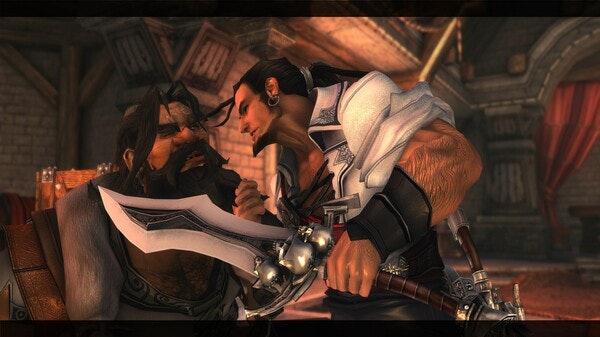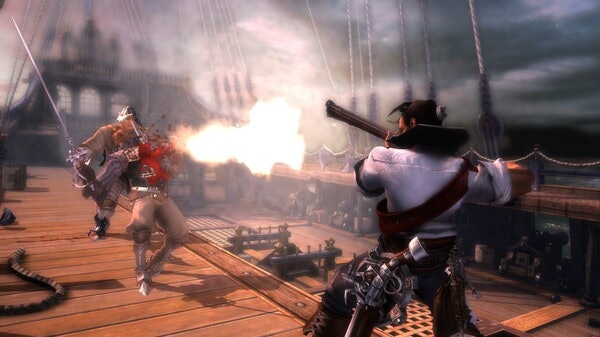
At long last, Captian Blood, a forgotten, pirate-themed brawler canceled more than a decade ago right before its release, is finally making its way to consoles and PC this fall. And by the looks of its re-reveal trailer, this time capsule of a game looks like a fun, action-heavy throwback to the bygone era of gaming it belongs to.
Captain Blood's unexpected reemergence is being helmed by developers Seawolf Studio and General Arcade, and published by SNEG, a company founded by former staffers of the digital game storefront GOG. When the game releases later this year, it will have been 20 years since it was first shown to the public, and 14 years since its original publisher, abruptly spiked the game despite journalists at the time playing a feature-complete demo of the brawler.
Players take control of the titular Captain Blood, “a fearsome pirate seeking gold and glory” named after the adventure-seeking hero of Rafael Sabatini’s 20th-century series of novels. The new, tongue-in-cheek trailer shows much of what players expected from the pirate game back when it was supposed to come out: protagonist Captain Blood trading blows with enemy pirates using cutlasses and flintlock pistols, hopping through dangerous obstacles, firing ship cannons, and encountering some admittedly cool-looking bosses.
Captain Blood is also retaining its stylized, cartoony look, though according to the developers, the graphics have been cleaned up since the last showing.
“The game underwent several iterations throughout the 2000s and was last showcased in 2010 before vanishing for years,” the game’s Steam page reads. “Now, we are excited to bring it back, combining its original glory with a series of modern improvements for today's gamers.”
The fact that Captain Blood had so many iterations, to begin with, is what makes this upcoming release so notable. When the game began development in 2003, it was part of a long lineage of pirate games in the Sea Dogs series. This spinoff was a more action-focused title, totally different from the role-playing games for which the series was known.
Despite officially being announced in 2004 alongside a trailer, the game’s development was very rocky. It was restarted at least three times, according to a deep dive on the canceled project published by Game Developer, before it was finally shown once again in 2008. In those four years, the rights to publish the game in the U.S. and UK was sold to publisher PlayLogic, while the team was sold to local publisher 1C.

The game was delayed from its original 2009 release to 2010. Development woes aside, the game was previewed by the press in 2010 and got as far as being printed onto DVDs in preparation for retailers. Unfortunately, however, unspecified legal disputes between the two publishers and developer Akella over who owned the Captain Blood game IP put the game on hold indefinitely.
Its 2010 release was pushed to 2011 before updates on the upcoming game halted entirely. The game remained suspended in development hell because of the dispute, seemingly destined never to see release despite its official website remaining online for years.
After its topsy-turvy production, however, it looks like SNEG figured out the legal minefield that pushed this game into Davey Jones’ locker and is ready to release it on virtually all available consoles.

While Captain Blood looks admittedly dated by today’s standards compared to other contemporary pirate games like Sea Of Thieves, its straightforward brawler gameplay still looks like a fun way to spend a weekend or two, especially for those who remember the fun of mid-budget, 360 and PS3-era titles. The original developers also cited PS2-classics like the underrated licensed Lord Of The Rings games as a major inspiration for Captain Blood, more reason to keep an eye out for this one.
Captain Blood’s release marks another major victory for the ongoing effort to preserve lost games. While developers like Digital Eclipse have gone out of their way to revive old games with tons of insightful special features, gaming is infamous for losing seminal titles to history thanks to lapsed rights and a failure to keep development files preserved.







